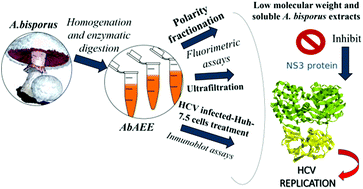Abstract
Hepatitis C virus (HCV) is the main agent responsible for chronic liver disease. Recent advances in anti-HCV treatment strategies have significantly increased the viral clearance rate (>90%). However, sustained antiviral responses vary in different cohorts, and high costs limit the broad use of direct-acting antivirals (DAAs). The goal of this study is to evaluate the inhibitory ability of well characterized (LC-QTOF-MS/MS) aqueous extracts obtained from edible mushrooms (Agaricus bisporus) to diminish HCV viral replication. Our data have demonstrated an in vitro inhibitory effect of A. bisporus extracts on NS3/4A protease and HCV replication. Fractionation by ultra-filtration and sequential liquid–liquid extraction showed that the compounds responsible for the inhibition are water-soluble with low molecular weights (<3 kDa) and that action could be through the following five compounds: ergothioneine, adenine, guanine, hypoxanthine, and xanthine, which are present in all fractions (UF-3, AqF-3 kDa and organic fractions) showing NS3/4A inhibition. Low molecular weight aqueous extracts (<3 kDa) from A. bisporus have potential applications in the prophylaxis and treatment of HCV, especially for patients who do not have access to the last generation of DAAs. They may be useful as well for other flaviviruses, which also possess a NS3 serine protease.
